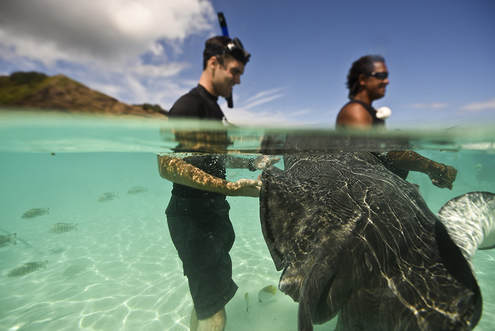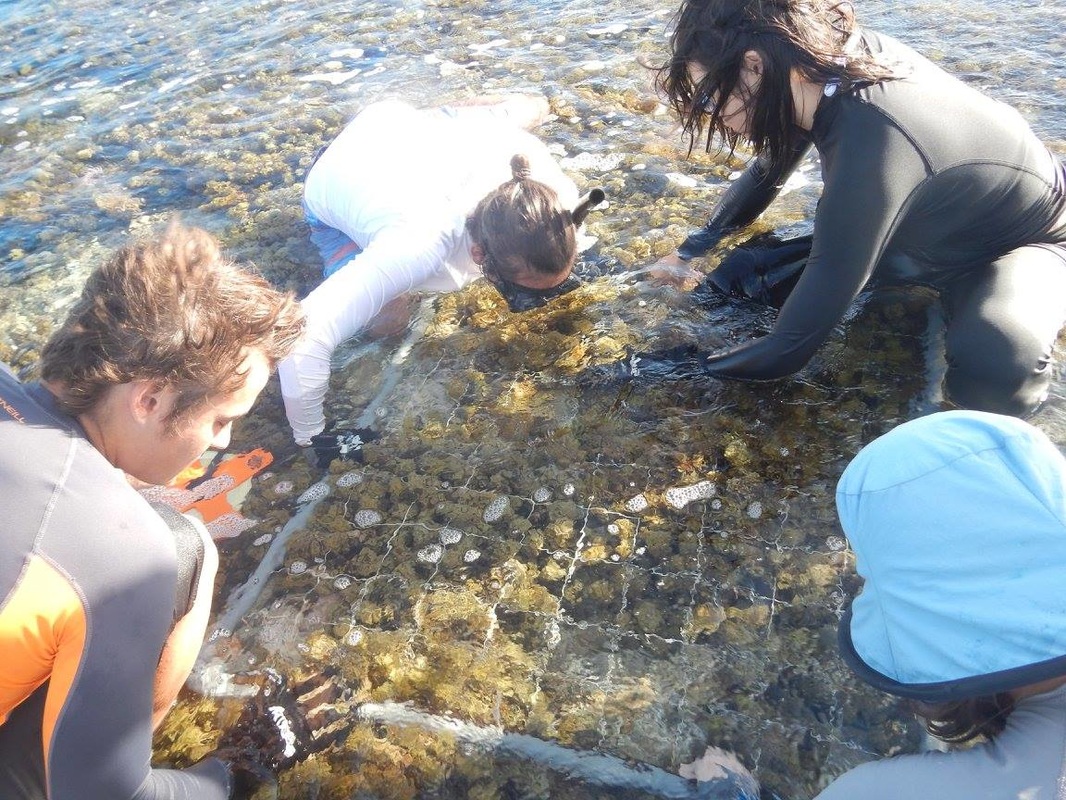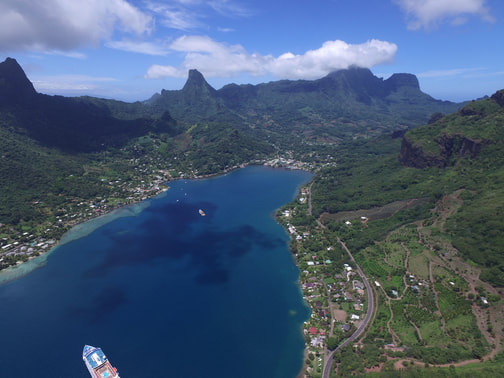Biology and geomorphology of tropical islands
Course Number: ESPM C107 or IB 158LF
Semester Taught: Fall 2024 Credits: 15 How to Enroll: Students must apply and interview. Location: Moorea, French Polynesia Home Base: UC Berkeley Gump Research Station The Application for Fall 2024 is now open through this google form (click for link). Applications are due Weds, 20 March 2024 at 5 pm, Pacific Time. The application process is described in detail on the Application page. The course is taught entirely off-campus with course time in Moorea, 10 weeks, tentatively for Fall 2024, 15 Sept - 24 Nov. If you would like more information about the course, please email one of the professors for 2024 (click for links): Cindy Looy, Jonathon Stillman, Albert Ruhi or George Roderick. Important Dates and Passport InfoPassport Note: Updated passports with and expiration date at least 3 months after the end of the program date, are required before final admission will be approved in May. This is a Study Abroad policy. So, if you are planning to study abroad in Fall, please update your passport now and ask for expedited services, since it is taking longer than usual. Students from some countries may also need a visa.
March: Applications due on-line. Early April: Potential interviews April: Students notified of acceptance April: Required course meeting |
Introduction
|
This course offers a transformative field research experience that many former students consider the capstone to their years at Berkeley. This course also qualifies as a course-based undergraduate research experience (CURE). The course begins with some background work and preparation to provide the contextual framework for course (remotely). The students then depart for approximately 10 weeks at the Richard B. Gump South Pacific Research Station on Moorea in French Polynesia. While in Moorea, students design and execute their own independent research projects, starting with the initial preliminary studies and ending with statistical analyses and writing. The final weeks are spent remotely during which time students write up their findings, consult with GSIS, professors, and study groups, and prepare and present a professional seminar on their projects. The class size is limited to 25 students by the Gump dormitory facilities. Note: this course is 100% off campus, with 10 weeks on Moorea and remote instruction before and after.
|

Students learn about the biology, geology, evolution, and people of the South Pacific. They develop the fundamentals of field research and work with faculty members to develop an independent project on an island topic, such as marine or terrestrial ecology, volcanic geomorphology, biodiversity, invasion biology, animal behavior, or oceanography of reefs and islands. This is a field course based at a tropical field station that involves vigorous activities including hiking in forests and on steep trails and swimming and snorkeling in marine and fresh waters. The field station is rustic and lacks many of the amenities students may be accustomed to in dormitory life on campus. The cooking staff can accommodate a large number of diets, although the diversity of options for some diets may be limited at times. A Visitor’s Guide for what to expect is available on the Gump Station web site, http://moorea.berkeley.edu, which includes more complete information.
Interested students should complete the course application. Selected students are then interviewed by course instructors. Students from other UC's and CSU's may take this course, though preference is given to Berkeley students. Those selected for interviews will be called or emailed to arrange for an interview in April. This is a 15-unit course and enrollment is by application and interview only. In addition to Berkeley tuition and fees, additional costs include airfare, lodging, food, and research expenses. Financial assistance is available for qualified students through the Financial Aid Office. Air fare from the Bay Area varies depending on ticket source and time of purchase. A valid passport is required, and if you do not hold a US or EU passport, also a visa. With the delay in getting passports renewed, we encourage students thinking about taking this course in future years to update their passports now. ***Current passports that extend 3 months after the course ends (i.e., March following the Fall semester) are now required before final admission will be approved in May.***
This Fall Moorea Class (ESPM C107/ IB 158LF) is a rigorous course-based undergraduate research experience (CURE), designed for students in science majors and related disciplines. UC Berkeley is also offering a Spring Island Sustainability Semester (ESPM 109A-E), which was taught for the first time this Spring semester 2022. The Island Sustainability Semester is a set of rigorous co-requisite courses covering a range of interdisciplinary topics that encompass sustainability. This course is designed for students of all majors. If you would like more information, please see the site noted above. It is possible to take both courses. If you do take both, we would suggest taking the Spring island sustainability course first, and the Fall biology and geomorphology course second. Because of the integrated nature of course(s) in both semesters, reduced course load (RCL) is not possible for either semester and in the Spring, students must take all five courses.
Interested students should complete the course application. Selected students are then interviewed by course instructors. Students from other UC's and CSU's may take this course, though preference is given to Berkeley students. Those selected for interviews will be called or emailed to arrange for an interview in April. This is a 15-unit course and enrollment is by application and interview only. In addition to Berkeley tuition and fees, additional costs include airfare, lodging, food, and research expenses. Financial assistance is available for qualified students through the Financial Aid Office. Air fare from the Bay Area varies depending on ticket source and time of purchase. A valid passport is required, and if you do not hold a US or EU passport, also a visa. With the delay in getting passports renewed, we encourage students thinking about taking this course in future years to update their passports now. ***Current passports that extend 3 months after the course ends (i.e., March following the Fall semester) are now required before final admission will be approved in May.***
This Fall Moorea Class (ESPM C107/ IB 158LF) is a rigorous course-based undergraduate research experience (CURE), designed for students in science majors and related disciplines. UC Berkeley is also offering a Spring Island Sustainability Semester (ESPM 109A-E), which was taught for the first time this Spring semester 2022. The Island Sustainability Semester is a set of rigorous co-requisite courses covering a range of interdisciplinary topics that encompass sustainability. This course is designed for students of all majors. If you would like more information, please see the site noted above. It is possible to take both courses. If you do take both, we would suggest taking the Spring island sustainability course first, and the Fall biology and geomorphology course second. Because of the integrated nature of course(s) in both semesters, reduced course load (RCL) is not possible for either semester and in the Spring, students must take all five courses.
A Berkeley Semester on Moorea, produced by Roxanne Makasdjian, Berkeley News Center
Link to an older (also most awesome) video (on YouTube...)

